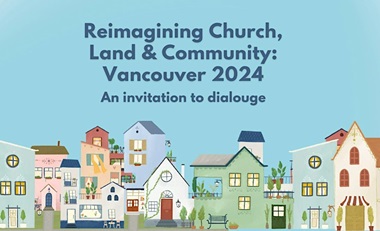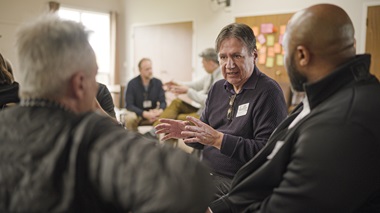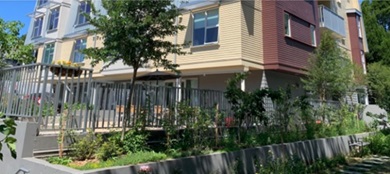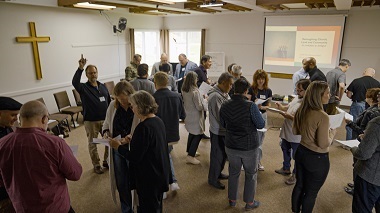
The ‘Reimagining Church, Land and Community’ gathering will take place March 12 – 13.
Over 20 years ago at an annual meeting, Grandview Church began exploring how they might develop their parking lot as well as the lot next door (which had become a community garden).
Already then, in 2002, building affordable housing was identified as the number one priority for that land. Thus began a long journey which eventually, in 2017, resulted in the opening of the four-storey Co:Here building at 1st Avenue and Victoria Drive.
The building offers 28 individual independent apartments of affordable housing (16 at social assistance rates), community gardens, a ground floor of amenity space (dining room, living room, kitchen, meeting rooms), underground parking (mostly for the church since the majority of residents are not vehicle owners) and a space between every five units designed to foster a shared life.
More importantly, the Co:Here building offers a good, secure home for people who have dealt with substandard, precarious housing for much of their lives.
Vancouver gathering

Indigenous theologian and leader Adrian Jacobs at the Ontario meeting. To his left is Tellison Glover of the Anglican Diocese of New Westminster.
The Co:Here experience is just one of many stories about creative use and development of church lands that you will hear at Reimagining Church, Land and Community: Vancouver 2024.
During this gathering, which will take place from Tuesday evening March 12 to Wednesday March 13, participants will have the following opportunities:
-
- On Tuesday evening, participants can listen to and share in a dialogue with Indigenous theologian and leader, Adrian Jacobs, and Anglican priest and theologian Jason McKinney, around particular theological perspectives that shape our current approaches to land and property, as well as some shifts in those perspectives that could provide new imagination for how we come to property and land questions. We intend to explore this theme throughout Wednesday as well. Adrian and Jason spoke together at an Ontario gathering, also sponsored by CityGate; they had a profound effect on all of us who were present.
- On Wednesday morning, participants will hear six or seven stories of creative property utilization or development (including a report on research done on church properties across the country by Wycliffe Seminary). In Ontario, we heard stories of supportive housing, affordable housing, eco-stewardship architecture, community hub uses and designs, social enterprise start-up space and other creative uses. These kinds of stories and more will be told in the Vancouver gathering.
Following the storytelling, we will hear from a panel of key stakeholders including Lisa Helps (BC Builds), Christine Boyle (Vancouver City Councilor), Nicholas Lai (long-time Surrey City planner) David Ley (Urban Geographer), and Michael Guenter (Vice President of Development at Concert Properties).
Time has also been set aside to dialogue with the panelists and storytellers around individual tables and then to work towards common points of action at these tables.
Finally, following gatherings with denominational cohorts over lunch, we will be led in a workshop which covers the planning and development process by Charlotte Au, Rebecca Pousette and Andy Lambkin, all of whom have experience in working with churches around development.
Compelling narratives

The Co:Here housing project at the corner of 1st and Victoria Drive in Vancouver.
Multiple narratives and emerging questions compel churches and denominations to be proactive (rather than reactive) around changing our approaches to church land and buildings:
a. There is the narrative of church closures – close to 4,500 across Canada in the last decade. How might we retain these properties for the common good and for God’s restoring work in the world?
b. There is the narrative of under-utilized land and buildings, especially in urban centres. How might we better utilize and sustain these places, especially in light of civic pressures to ‘use them or lose our tax-exempt status?’
c. There is the narrative of new church start-ups – 3,200 in the last decade – who are looking for meeting spaces and struggling to find suitable church buildings. How do we work across denominations to meet this need given that civic governments are not creating space for new church buildings?
d. There is the narrative of the loss of sacred space. How can we retain sacred space when congregations are dwindling?
e. There is the narrative of broken treaties on Indigenous land. How might church lands serve as symbols of land reconciliation?
f. Finally, there is the narrative of the rapidly expanding housing crisis facing our cities? How might churches contribute to housing solutions through a reimagining of their land and buildings?
Who should participate?

Participants at an earlier event in Ontario.
For all these reasons and more, engaging this conversation does seem urgent and vital for the church in Canada at this time.
We hope this gathering will provide the occasion for church and denominational leaders as well as architects, developers, planners, politicians and other stakeholders to dialogue, learn from and with each other, and to chart a pathway together for how we might better approach the use and potential development of our church properties.
A number of denominations have been involved in the planning of this event, including Anglicans, Mennonites, United, Reformed, Presbyterians and others. We have been encouraging at least three groups of people to participate in the upcoming event:
1. Those churches who are already thinking about development.
2. Those denominations and churches with underutilized land or buildings who have never thought about development.
3. Those who are catalysts within your denomination who, when resourced and equipped by this gathering, will help carry the conversation forward with your churches. We have already seen how those equipped at the Ontario gathering last year have capably consulted with churches, particularly those lacking capacity to carry this conversation but needing to have it most.

Tim Dickau
The time for this conversation is now if we are going to reimagine our use of church properties. I hope you will take up the opportunity and join in the dialogue.
Tim Dickau is Director of CityGate Vancouver, as well as CML Associate for the Missional Leadership Certificate Program. Prior to taking on these roles, Tim served for 30 years as pastor of Grandview Church in East Vancouver.

Hello brethren,
Thank you for sharing this information. How do we register and find more information about this event please?
Hello John:
Go here to register:https://www.eventbrite.ca/e/reimagining-church-land-community-vancouver-2024-tickets-784585695937
Thank you Flyn, much appreciated.